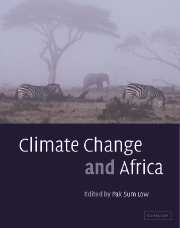Book contents
- Frontmatter
- Contents
- Notes on contributors
- Peer reviewers
- Editor's note
- Foreword
- Foreword
- Foreword
- Foreword
- Preface
- Preface
- Preface
- Preface
- List of abbreviations
- List of SI prefixes
- List of unit abbreviations
- List of chemical formulae
- Part I Science
- Part II Sustainable energy development, mitigation and policy
- Part III Vulnerability and adaptation
- Part IV Capacity-building
- Part V Lessons from the Montreal Protocol
- Index
Preface
Published online by Cambridge University Press: 10 December 2009
- Frontmatter
- Contents
- Notes on contributors
- Peer reviewers
- Editor's note
- Foreword
- Foreword
- Foreword
- Foreword
- Preface
- Preface
- Preface
- Preface
- List of abbreviations
- List of SI prefixes
- List of unit abbreviations
- List of chemical formulae
- Part I Science
- Part II Sustainable energy development, mitigation and policy
- Part III Vulnerability and adaptation
- Part IV Capacity-building
- Part V Lessons from the Montreal Protocol
- Index
Summary
The key to food security is regular access to food, in a context where many factors seem to be competing to make its supply scarce and irregular. In Africa, as in most of the world, the variability of climate over seasons, years and decades, has been a dominant factor. This was dramatically illustrated by the latest drought episode in the West African Sahel between the 1960s and the late 1980s. Some papers recently published suggest a link between the drought and atmospheric pollution in the developed world, a reminder that human activities can affect climate, locally and globally, at many scales.
Over the last two decades, war has overtaken climate fluctuation as the dominant factor in food insecurity, particularly in Africa where civil unrest and war have killed people, driven them off their land and led to the creation of large refugee settlements. However, even humanitarian crises must be seen in their climatic context, as many tense and unstable situations have been created by high food prices due to drought. Many farmers are forced off the land at harvest or planting times, and many choose to grow cassava, safely concealed in the ground, rather than the conspicuous maize cobs that are so attractive to refugees and soldiers. Compared with cereals, cassava is drought resistant but poor in proteins, so that some farmers' attempts to ensure food production actually contribute to malnutrition.
- Type
- Chapter
- Information
- Climate Change and Africa , pp. xxxiPublisher: Cambridge University PressPrint publication year: 2005



